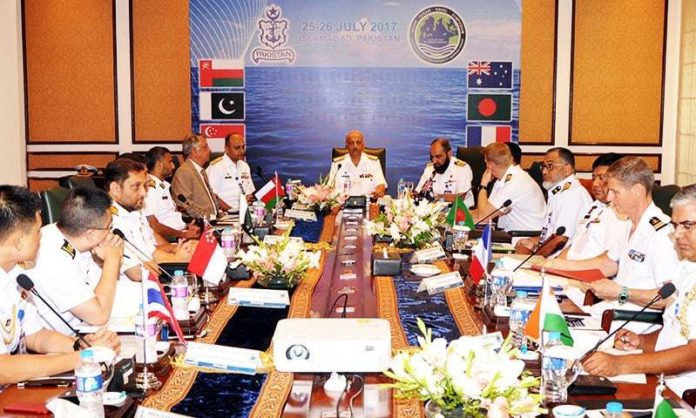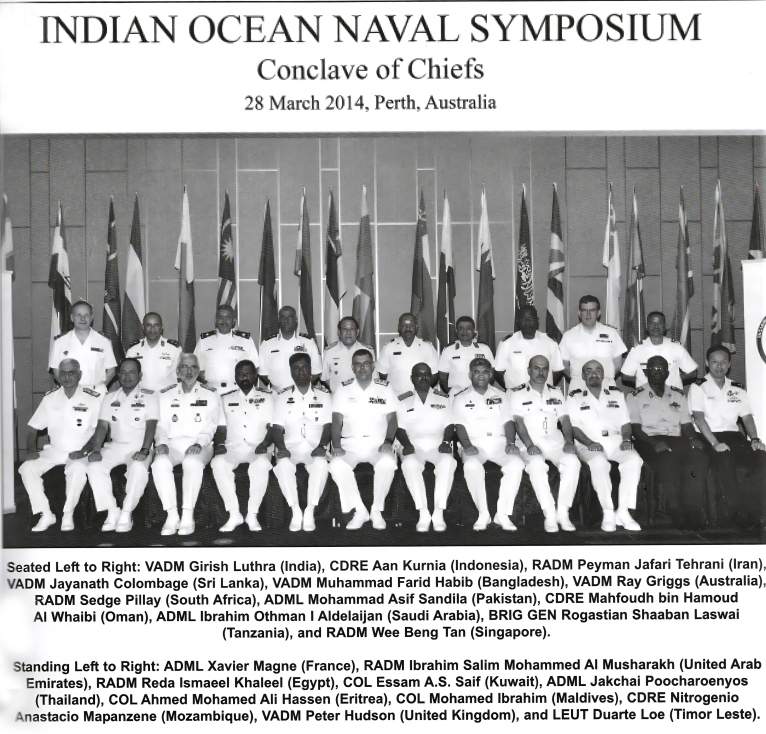
Indian Ocean Naval Symposium, simply speaking, is a maritime forum set up for the express purpose of enhancing collaboration in terms of collective security between states whose shores, inclusive of permanently held territories, are washed by the Indian Ocean as well as those which have a visible stake in its future. I wouldn’t be at all surprised if most of the readers find this terminology (IONS) unfamiliar, as it doesn’t feature much in the news. This is possibly about to change as Pakistan’s involvement becomes increasingly prominent. Ever since the inaugural symposium was successfully hosted by the Indian Navy in 2008 on the vital theme of ‘Contemporary Trans-national Challenges – International Maritime Connectivities’, IONS has been providing a much-needed forum for naval professionals, specifically naval chiefs, of all member states from the South Asian, West Asian (Middle East), East African, South East Asian and Australian littorals, to directly interact with each other in a bid to enhance maritime cooperation and generate better mutual understanding. The involvement in this forum of the top tier of naval leadership of the Indian Ocean littoral states enables cooperative solutions to be found to the common maritime problems that plague the region.
Since its inaugural session in 2008, the Indian Ocean Naval Symposium has been organised four more times at two yearly intervals, in UAE, South Africa, Australia and Bangladesh respectively. The beauty of the enterprise is that all member countries are treated at par, regardless of the size of their navies or their international clout. The IONS chair is thus rotated every two years, with its selection being arrived at through consensus. In fact, the host countries for the next two symposiums along with tentative dates are decided upon at each IONS meeting. During IONS ’14 for instance, Bangladesh and Iran were confirmed as hosts for the 2016 and 2018 symposiums respectively.
In every IONS, a day or two is reserved for what is termed as a ‘Conclave of the Chiefs-of Navy’, which furnishes an ideal platform for the Heads of the Navy to directly communicate with each other, leading to better understanding, consensual decision-making and its effective implementation.
The agenda for each IONS is drawn up through exhaustive deliberations during the preceding year at a preparatory workshop. Another significant activity is at times combined with the main preparatory objective, like the working group meeting on ‘Info Sharing & Interoperability’ as was done in September 2015 at Karachi. In addition, certain other activities are also regularly planned and conducted, like Open Essay Competitions, a technical seminar, Humanitarian Assistance & Disaster Relief (HADR), Anti-piracy Conceptual and Operational workshops, etc. Realising the necessity for propagating the aims and achievements of the Indian Ocean Naval Symposium, the IONS website (ions.gov.in/) and the first edition of the IONS newsletter was launched in 2012, followed by three further editions of the magazine.

As far as Pakistan’s involvement in IONS is concerned, the most notable feature has been the presence of its Naval Chief at the 2014 edition of the symposium at Perth, during which he also participated in the conclave of Chiefs of Navy. This enabled Pakistan to become an effective part of a vital maritime activity in which most navies of littoral states were already actively participating. Ever since Pakistan was accorded observer status, various symposiums and workshops were being attended either by mid-ranking naval officers or by Pakistan’s respective Defence Attaches at various venues. Pakistan Navy also took part in two Open Essay Competitions, in one of which a retired naval officer serving as DS (Research) at the PN War College attained the second position. As soon as Pakistan achieved full membership status at the IONS meeting in 2014, in which the Naval Chief also participated, Pakistan Navy was selected to host the preparatory workshop planned for the following year. This workshop, along with the IONS Working Group meeting on Information Sharing & Interoperability, was organised in mid-September 2015 in a professional manner, with delegates from as many as 16 member states including observer and observer applicant countries participating. This preparatory workshop acts as a useful prelude for laying the groundwork for the forthcoming symposium. IONS 2016, held at Dhaka in January, showcased the Bangladesh Navy’s competence and hospitality. It was the good fortune of this scribe to be present on the occasion, having been invited by the Bangladesh Naval Chief to moderate the session on ‘Maritime Cooperation and Collaboration’.
Now that IONS 2017 is again round the corner, the preparatory workshop has been tentatively scheduled in September this year in South Africa. Pakistan, which holds the chair for the IONS Working Group on Information Sharing & Interoperability will again be hosting the said meeting in the last week of July, during which all ten of its member countries are expected to participate. Realising that information sharing and interoperability are prerequisites for collaboration and engagement at the field level, this working group will focus its efforts on the ways and means of achieving improvements in the field.
Since its inception, IONS has become a robust interactive forum for generating greater mutual understanding to the ultimate benefit of the region and for brainstorming solutions to maritime issues of common interest. The theme of the 2010 symposium ‘Togetherness for the Reinforcement of Maritime Security in the Indian Region’ best epitomises the philosophy and the spirit of the forum. Extra-regional countries like UK and France have also become full members by virtue of a clause that allows states with permanently held territory within the Indian Ocean region to do so. Countries like China and Japan, likewise, hold full observer status, while European ones like Russia, Spain and Italy have applied for similar status, making use of a clause enabling a Navy with significant strategic interests to be so entitled. IONS, it should be understood, is not merely a forum for exchange of views but provides a much needed platform for Naval Chiefs and other naval officers representing as many as 28 countries to fraternise with each other on a professional and social level.
IONS presumably took its cue from the Western Pacific Naval Symposium (an initiative of the United States), which held its first meeting in 1988. Incidentally, Pakistan also obtained Observer Status of this forum (WPNS) in April of 2015. In the formative years of the IONS, Pakistan was needlessly swimming against the tide by non-participation, or at best limited participation, till the historic 2014 IONS breakthrough by its Naval Chief, which broke the logjam and enabled the country to become a part of the mainstream discourse. Pakistan’s active participation, with the hosting of the preparatory workshop and a working group meeting in September of 2015 and the forthcoming working group meeting on Information and Interoperability in July this year will hopefully prove to be beneficial for the country as well as add to the vitality of this dynamic forum.




